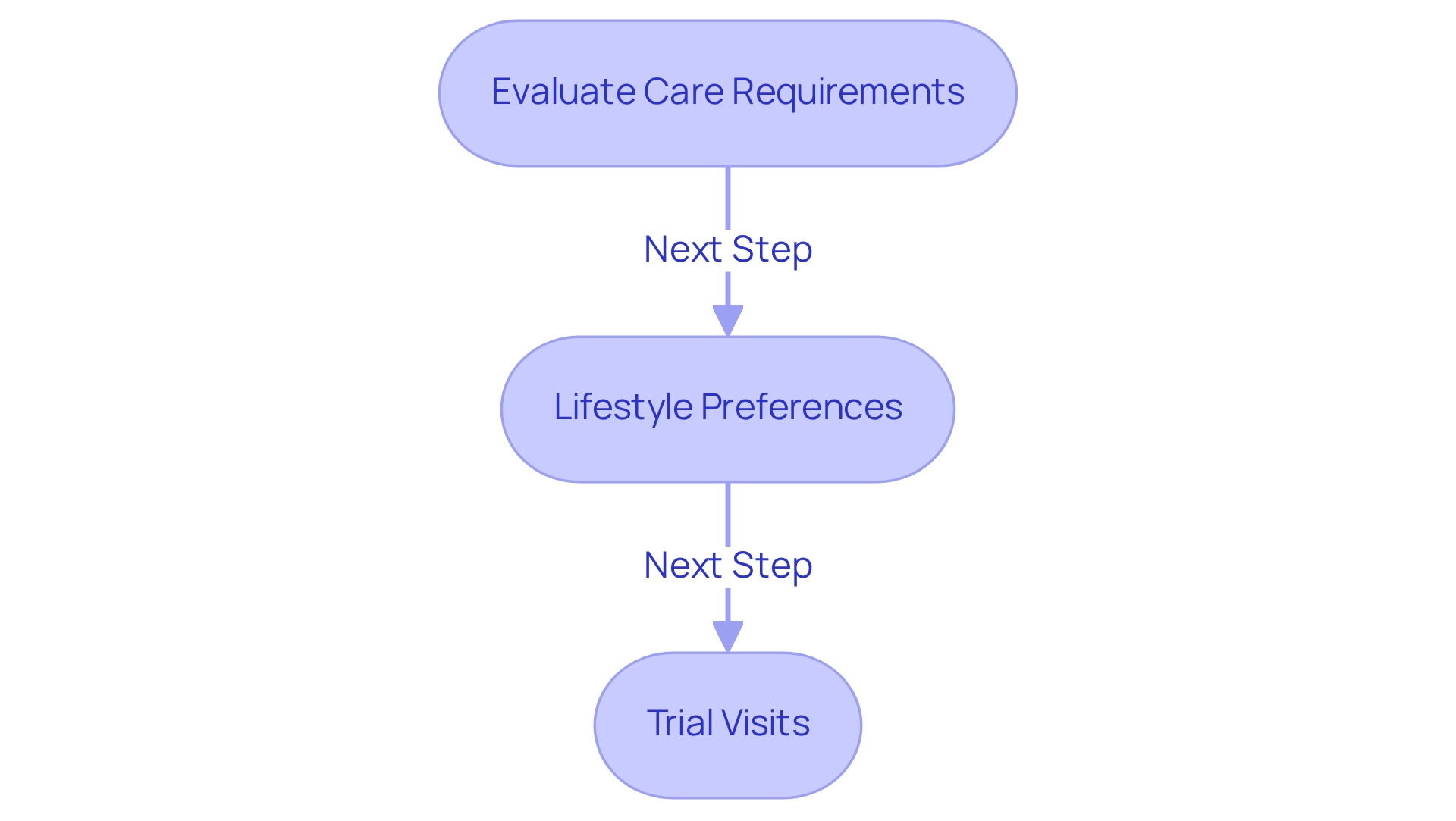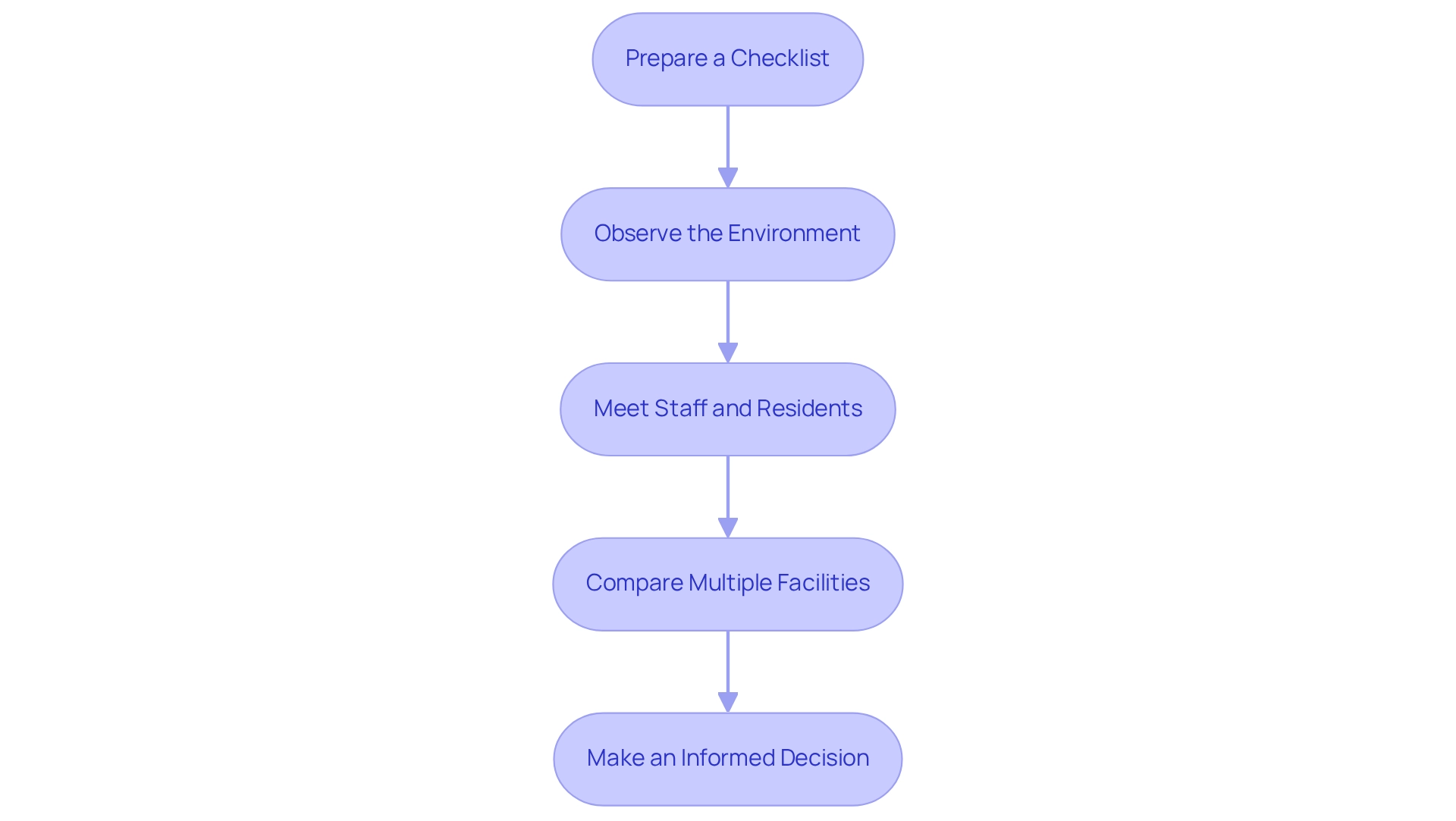Overview
Navigating assisted living options in Miami, Florida, can be a daunting task for families. This article outlines a structured approach that emphasizes key steps to help you find the right fit for your loved ones. It’s essential to understand assisted living terminology, as this knowledge lays the foundation for informed decisions.
As you begin this journey, consider evaluating crucial factors such as:
- Location
- Services
- Costs
Assessing personal care needs and lifestyle preferences is equally important, ensuring that the chosen facility aligns with your loved one’s unique requirements.
Conducting thorough visits to potential facilities is vital. These visits allow you to gauge the environment and feel the warmth of the community. By taking these steps, you can enhance the quality of life for seniors and make choices that resonate with their needs. Remember, your comfort is our priority, and we’re here for you every step of the way.
Introduction
Navigating the world of assisted living can feel overwhelming for families who want the best care for their loved ones. As our senior population grows, it’s essential to understand the intricacies of assisted living. Families must equip themselves with knowledge about key terms and vital factors such as location, services, and costs to make informed decisions that truly reflect their loved ones’ needs.
In this article, we will explore the important concepts and considerations surrounding assisted living. Together, we will offer insights on:
- Evaluating personal needs
- Comparing facilities
- Ensuring that seniors receive the compassionate support they deserve in a nurturing community setting.
Understand Assisted Living: Key Concepts and Terminology
Assisted living in Miami Florida serves as a vital residential choice for older adults who need help with daily tasks but do not require the extensive medical care offered in nursing facilities. Understanding key terms can greatly help families navigate these options with confidence:
- Activities of Daily Living (ADLs): These essential self-care tasks include bathing, dressing, eating, and mobility. Recognizing the importance of ADLs is crucial, as over fifty percent of residents in support facilities require help with these activities. Matthew Clem, a Registered Nurse, emphasizes this need, stating, “more than half of residents in supportive environments require assistance with walking and bathing.” Without the right support, seniors may experience health declines, poor nutrition, hygiene issues, increased risks of falls, medication mismanagement, and household hazards, all of which can significantly affect their quality of life.
- Personal Care Assistance: This support includes help with ADLs and is typically provided by skilled personnel within support facilities. Caregivers not only assist with daily tasks but also enhance emotional well-being by alleviating feelings of isolation and loneliness, offering essential companionship and support.
- Memory Support: Tailored specifically for residents with Alzheimer’s or other forms of dementia, this specialized assistance is often available in dedicated units within supported communities, addressing the unique needs of these individuals.
- Independent Living: This option caters to seniors who are generally healthy yet value the benefits of a community environment with some available assistance, fostering social interaction and engagement.
Currently, about 10% of older adults in the U.S. utilize support services, reflecting a growing trend towards community-based assistance. As the older population continues to expand, understanding the terminology and concepts related to supportive housing becomes increasingly important. Recent trends highlight a shift in language and definitions within the industry, underscoring the need for clear and accessible communication. Additionally, it is essential to recognize the cultural and racial disparities in supportive housing, as these inequalities can impact access to care for BIPOC seniors. By grasping these key concepts, families can more effectively articulate their needs and preferences when exploring assisted living in Miami Florida and other supportive housing options, ultimately leading to more informed decisions for their loved ones in Broward County.
Evaluate Essential Factors: Location, Services, and Costs
When considering assisted living in Miami, Florida, families often find themselves navigating a complex landscape of choices. It’s essential to evaluate several critical factors that can significantly impact the well-being of their loved ones.
- Location is a primary concern. The proximity to family and friends is vital for maintaining connections and ensuring regular visits. Families should consider neighborhoods that are not only safe but also easily accessible, enhancing the overall comfort for residents.
- Services Offered vary greatly among assisted living facilities. Families should seek options that align with their loved one’s specific needs, such as medication management, physical therapy, and opportunities for social engagement. For instance, Marilin ALF provides a cozy, close-knit atmosphere with customized attention. One family member shared, “My sister-in-law is in Marilin ALF, and it is super good. It is a very small, single family home. It only has six residents in total. Two CNAs are there 24/7, and they take excellent care of the patients. What caught my attention the most was the tidiness…” Furthermore, the incorporation of CNA/HHA caregiver assistance can greatly improve the quality of life for seniors. These offerings provide crucial aid with everyday activities, ensuring that seniors receive the necessary help for personal hygiene, medication oversight, and emotional care. Such support can reduce feelings of isolation and enhance overall wellness. Without these resources, seniors may face health declines, inadequate nutrition, hygiene concerns, mobility difficulties, social isolation, household risks, and medication mismanagement, all of which can greatly affect their quality of life.
- Costs also play a significant role in the decision-making process. Understanding the pricing structure is crucial. Starting in 2025, the costs of assisted living in Miami, Florida, range from around $2,375 to $5,923 each month, depending on the degree of assistance and amenities offered. Families should be aware of potential extra charges for services such as transportation or specialized assistance. Exploring financial assistance options, including long-term care insurance and Medicaid, can help alleviate some of the financial burdens associated with these facilities. Additionally, families can benefit from resources such as Florida’s Long-Term Care Ombudsman Program, which offers guidance and support during the search for the appropriate supportive housing community.
By carefully evaluating these factors, families can effectively narrow down their choices to facilities that best meet their loved ones’ needs, ensuring a supportive and enriching environment. Miami also provides numerous resources for seniors, including meal programs, legal assistance, and social activities, which can significantly improve the quality of life for residents. Remember, we’re here for you, and your comfort is our priority.
Assess Personal Needs: Care Requirements and Lifestyle Preferences
To effectively evaluate personal requirements for assisted care, consider the following steps:
- Evaluate Care Requirements: Begin by identifying specific health conditions or disabilities that may necessitate assistance. This includes mobility challenges, chronic illnesses, or cognitive impairments, which are prevalent among seniors. Have you noticed difficulty with personal hygiene, dressing, cooking, cleaning, or managing medications? These indicators suggest the need for CNA/HHA caregiver services. CNAs (Certified Nursing Assistants) usually undergo comprehensive training centered on medical procedures, whereas HHAs (Home Health Aides) are educated to help with personal assistance and daily activities. It’s important to recognize that a considerable segment of care facility residents are women, many of whom confront issues like Alzheimer’s or other types of dementia. In fact, studies indicate that women reside in long-term assistance facilities for an average of 3.7 years, whereas men inhabit these facilities for an average of 2.2 years. Understanding the duration of support needs is critical.
- Lifestyle Preferences: Engage in discussions about activities and social interactions that are meaningful to your loved one. Do they prefer a tranquil environment or a vibrant community? Understanding these preferences can significantly impact their satisfaction in assisted living. Expert insights suggest that aligning lifestyle preferences with facility offerings is crucial for enhancing overall well-being. Furthermore, maintaining transparent dialogue with caregivers and the home assistance agency is essential to ensure that individual support requirements are fulfilled efficiently.
- Trial Visits: If feasible, arrange trial visits to potential facilities. This hands-on experience in assisted living in Miami Florida allows your loved one to gauge the environment and interact with staff and residents, providing valuable insight into their comfort level and fit within the community. By thoroughly assessing these aspects, families can ensure that the selected facility not only meets care requirements but also aligns with lifestyle preferences, ultimately enhancing their loved one’s quality of life. This method is vital, as research indicates that contentment in supported housing is closely linked to how effectively personal preferences are met. Moreover, the need for supportive housing options, particularly assisted living in Miami Florida, is rising, as demonstrated by a rise in average occupancy rates from 83.1 percent in Q1 of 2023 to 83.7 percent in Q2 of 2023. Failing to secure CNA/HHA services can lead to health declines, poor nutrition, hygiene issues, mobility challenges, social isolation, household hazards, and medication management problems. This underscores the importance of these services, as we’re here to ensure your comfort and well-being.

Visit and Compare Facilities: Conducting Effective Tours and Interviews
When visiting assisted living in Miami Florida facilities, it’s important to approach the experience with care and consideration. Here are some essential tips to ensure a comprehensive evaluation:
- Prepare a Checklist: Begin by developing a list of critical questions to guide your visit. Key inquiries should include staff qualifications, average resident-to-staff ratios—federal standards recommend at least one registered nurse on duty for 8 hours daily—and emergency procedures. Consider asking questions like: “What is the staff-to-resident ratio during peak hours?” and “How often are staff trained on emergency protocols?” This preparation will help you feel more confident during your visit.
- Observe the Environment: Take a moment to observe the facility’s cleanliness, safety features, and overall atmosphere. Are residents actively participating in activities? Do they seem content and well-cared for? A well-maintained environment is crucial for resident well-being. Remember, cleanliness and safety are paramount in ensuring a positive living experience for seniors.
- Meet Staff and Residents: Interact with caregivers and current residents to gain insight into the quality of assistance and community culture. Ask residents about their experiences and satisfaction with the services provided. High turnover rates among direct-care workers can indicate underlying issues, as experts note that factors like low wages and staffing ratios contribute to this challenge. Understanding staff dynamics is essential for assessing the support environment. Additionally, consider whether your loved one may need CNA or HHA services based on their ability to perform daily activities and health status, such as managing chronic conditions or recovering from surgery.
- Compare Multiple Facilities: After visiting several options, compile your observations to compare each facility’s strengths and weaknesses. Reflect on how well each aligns with your loved one’s specific needs and preferences. Investigating state regulations can also help you recognize communities that prioritize higher staffing standards for improved resident support. Furthermore, maintaining transparent communication with caregivers and the home assistance agency is crucial to ensure quality support. Customized guidance from Senior Living Advisors can assist families in discovering appropriate support options tailored to their loved ones’ needs.
By following these steps, families can make informed decisions about the most suitable assisted living in Miami Florida facility for their loved ones. Remember, your loved one deserves compassionate and personalized care, and we’re here to help you navigate this important journey.

Conclusion
Navigating the assisted living landscape can be a daunting task, but understanding key concepts and terminology is essential for making informed decisions. Families are encouraged to familiarize themselves with terms like Activities of Daily Living (ADLs), personal care services, and memory care. These components are vital in ensuring that seniors receive the tailored support they deserve, empowering families to articulate their loved ones’ needs and enhancing the overall quality of care.
As families evaluate potential facilities, it is important to consider factors such as:
- Location
- Services offered
- Costs
Proximity to family and friends fosters social connections, while the range of services available should align with the specific care requirements of the senior. Understanding the financial aspects, including average costs and potential assistance options, is crucial for making decisions that won’t lead to undue financial strain. By thoughtfully assessing these elements, families can identify facilities that provide a supportive and enriching environment for their loved ones.
Finally, discussing personal needs regarding care requirements and lifestyle preferences is essential for ensuring satisfaction in assisted living. Engaging in trial visits can further aid in determining the right fit. By prioritizing these considerations and following thorough evaluation steps, families can secure a compassionate and nurturing community for their loved ones. The journey toward finding suitable assisted living is a significant step in enhancing the quality of life for seniors, ensuring they receive the care and support they truly deserve in their golden years.
Frequently Asked Questions
What is assisted living in Miami, Florida?
Assisted living in Miami serves as a residential choice for older adults who need help with daily tasks but do not require extensive medical care, which is typically provided in nursing facilities.
What are Activities of Daily Living (ADLs)?
Activities of Daily Living (ADLs) are essential self-care tasks that include bathing, dressing, eating, and mobility. Over fifty percent of residents in support facilities require assistance with these activities.
Why is assistance with ADLs important for seniors?
Assistance with ADLs is crucial because without the right support, seniors may experience health declines, poor nutrition, hygiene issues, increased risks of falls, medication mismanagement, and household hazards, all of which can significantly affect their quality of life.
What is personal care assistance?
Personal care assistance includes help with ADLs provided by skilled personnel within support facilities. Caregivers not only assist with daily tasks but also enhance emotional well-being by alleviating feelings of isolation and loneliness.
What is memory support in assisted living?
Memory support is specialized assistance tailored for residents with Alzheimer’s or other forms of dementia, often available in dedicated units within supported communities to address their unique needs.
What is independent living for seniors?
Independent living caters to seniors who are generally healthy but value the benefits of a community environment with some available assistance, fostering social interaction and engagement.
What percentage of older adults in the U.S. utilize support services?
Currently, about 10% of older adults in the U.S. utilize support services, reflecting a growing trend towards community-based assistance.
Why is understanding terminology related to supportive housing important?
Understanding the terminology and concepts related to supportive housing is increasingly important as the older population expands, helping families articulate their needs and preferences effectively.
What disparities exist in supportive housing for seniors?
There are cultural and racial disparities in supportive housing that can impact access to care for BIPOC seniors, highlighting the need for clear and accessible communication in the industry.











